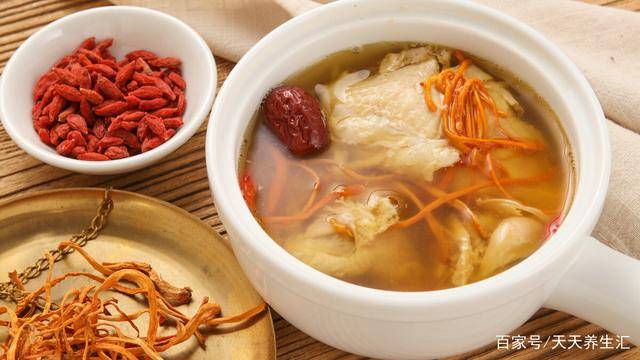Modern nutrition divides the nutrients needed by the human body into the “seven major” categories. Among them, proteins, fats, and carbohydrates can provide energy to the human body and are the basic substances for maintaining human life activities, synthesizing the three major nutrients. Consuming them excessively can lead to weight gain and be detrimental to human health. Additionally, there are minerals, vitamins, water, and fiber, a lack of which may lead to diseases; however, excessive intake can also increase the metabolic burden on the body.
Maintaining a reasonable balance of the “seven major” nutrients is more beneficial to human health.
Since ancient times, our nation has had the habit of “food supplementation,” with much experience worth learning from, albeit some practices not in line with human health needs.
Seven foods with functions exaggerated, excessive consumption worsens the body’s burden
1. Calcium supplementation with bone broth is greatly overestimated
For a long time, drinking bone broth for calcium supplementation was considered true. The reason being that bones contain high levels of calcium.
In reality, the calcium in bones is solidified bone calcium, and even after prolonged boiling, it can dissolve or “partially dissolve.” Therefore, the calcium in bone broth is not significant; the minimal calcium ions mainly come from bone marrow and some small pieces of meat, so drinking bone broth does not supplement calcium.
If you want to supplement calcium, it’s much better to eat meat, eggs, drink milk, consume legumes and their products, nuts, and vegetables with high calcium content.
Additionally, bone marrow contains very high purine substances, which dissolve easily in water; it also contains high levels of fat and cholesterol, which dissolve readily in water. Therefore, bone broth has a delicious taste due to its high purine content, cholesterol, and fat. Excessive consumption by middle-aged and elderly individuals can burden the liver, kidneys, and cardiovascular system, so less consumption is healthier.
2. Blood supplementation with red dates and brown sugar
Many women during menstruation or excessive blood loss like to eat red dates and drink brown sugar water for blood supplementation.
In reality, the role of red dates and brown sugar in blood supplementation is minimal; brown sugar contains high sugar content and can lead to rapid blood sugar spikes.
If sweet foods can relieve stress, it’s true, but for blood supplementation, it’s better to eat more red meat.
3. Breast enlargement by consuming papayas is a scam
Many women believe that eating raw or cooked papayas can promote breast development. There’s even a renowned dish called “Papaya Stewed with Snow Clam.”
However, papaya does not have this function, nor does any other food; therefore, claims of breast enlargement through papaya consumption are deceptive. Breast development is largely genetic, and the only way to enhance it is by maintaining a balanced diet and engaging in appropriate physical exercise.
4. Stomach nourishment through congee is overstated
Many believe that consuming congee can nourish the stomach.
In reality, well-cooked congee is easily digestible and absorbable by the stomach upon consumption, but that does not necessarily mean it nourishes the stomach; on the contrary, if we only consume easily digestible foods for an extended period, the stomach’s digestive function weakens due to lack of demand.
When the stomach feels uncomfortable or during illness, with weakened digestive absorption function, consuming congee can reduce stomach burden. Therefore, congee is more suitable for the elderly, infants, some patients, whereas in normal circumstances, a well-balanced diet and regular eating habits are the best ways to nurture the stomach.
5. Pig’s trotters for collagen supplementation
Many women enjoy eating pig skin or pig’s trotters, believing it can supplement collagen, making their skin more elastic.
Actually, consuming pig skin does not supplement collagen, but it can make the skin fuller and more elastic due to its abundant subcutaneous fat content. Overconsumption can lead to obesity, making the skin appear fuller and less saggy naturally – this effect is solely due to fat, not collagen. Obesity, however, brings its problems, so one must consider the pros and cons.
6. Medicinal liquor for health benefits
Many people like to soak medicinal herbs in liquor, thinking that consuming it can promote health.
In reality, drinking alcohol only burdens the body’s metabolism, leading to harm to multiple organs such as the liver, kidneys, heart, lungs, pancreas, and spleen. Health does not lie in drinking alcohol; true health comes from abstaining from alcohol.
7. Lemon water for vitamin C supplementation
Some believe that drinking lemon water can provide vitamin C supplementation; while lemon water does contain vitamin C, it’s not abundant. The good taste comes from various flavor enhancers, making it enjoyable but also adding to the body’s metabolic burden.
Similarly, some branded herbal teas have high sugar content and are more of a functional beverage than simply cooling agents. To truly alleviate internal heat, it’s necessary to avoid staying up late, smoking, drinking excessively, and preventing over-fatigue.
Overall, nutrition is crucial for the body, a lack of which can lead to diseases, but nutrition cannot replace medicinal treatment. Food primarily provides us with nutrients, energy, and supplements – the same applies to health products; hence, their functions should not be exaggerated. While nutrition is vital, it’s far from omnipotent and more isn’t always better.


